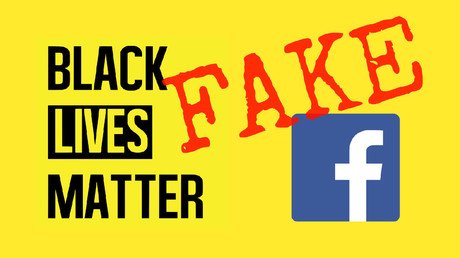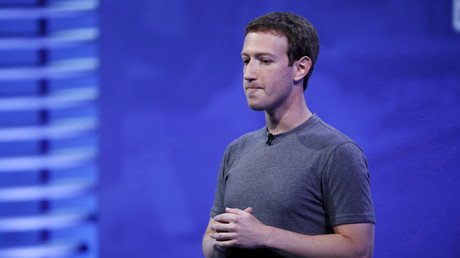More AI, policing content & other revelations from Zuckerberg’s Senate testimony
Facebook CEO Mark Zuckerberg spent five hours testifying to the Senate, defending the social network from charges of aiding ‘Russian meddling’ and even revealing a few trade secrets in the process.
The marathon session on Tuesday involved members of the Senate Judiciary and the Senate Commerce, Science, and Transportation committees. While the internet trolled Zuckerberg for using a booster seat and his meme-able, grade-school bowl haircut, Facebook’s stocks had their best day in two years, with a 4.5 percent surge after weeks of decline.
Mark is sitting on a booster seat. #ZuckUnderOathpic.twitter.com/urhxN6D20k
— Heather Timmons (@HeathaT) April 10, 2018
My first question if I was on the Senate committee "Mr. Zuckerberg you are a multi-billionaire and yet you still use a bowl to cut your hair, why?" #ZuckUnderOathpic.twitter.com/4JYtieog3S
— thehoch (@hochalicious) April 10, 2018
While Democrats seemed more concerned with passing new laws to regulate social media, Republicans asked pointed questions about Facebook’s “policing” of content on the platform.
AI will help Facebook ensure voice is 'used for good'
Zuckerberg himself opened that can of worms when he said that Facebook’s mission to connect people was not good enough anymore and that the platform needs to “make sure those connections are positive.”
While all voices are welcomed on Facebook, Zuckerberg insisted the platform will need to make sure “they’re used for good.” This will be done by tens of thousands of staff hired to review user posts and, going forward, with artificial intelligence (AI) tools.
Zuckerberg said he expects to have AI that can “get into the linguistic nuances of hate speech” within five to 10 years. Yet he could not define he meant by “hate speech” when asked by multiple senators.
Zuckerberg testified he's 'optimistic' that in 5-10 years, Facebook will have AI tools to automatically censor 'hate speech'. But he couldn't define 'hate speech', beyond whatever makes some people feel 'unsafe'. The problem of selective enforcement is horrifying. pic.twitter.com/i0Nc3RqgAV
— Geoffrey Miller (@primalpoly) April 10, 2018
Publisher, platform, or a bit of both?
This prompted questions from multiple senators as to whether Facebook is a public forum or a publisher, since different regulations would apply in each case.
“We don’t produce the content,” but “feel responsibility for the content on our platform,” Zuckerberg told Senator Dan Sullivan (R-Alaska).
“We need to make sure people aren’t bullied, or intimidated, or the environment feels unsafe for them,” he told Senator Mike Lee (R-Utah).
While Facebook’s goal is not to engage in political speech, he told Senator Ted Cruz (R-Texas): “anything that makes people feel unsafe in the community” is content that it will not allow. Cruz took issue with that, accusing Facebook of engaging in a “pervasive pattern” of suppressing conservative views and rattled off a list of examples.
“I understand where that concern is coming from,” Zuckerberg said, admitting that Silicon Valley is an “extremely left-leaning place.”
Cambridge Analytica and ‘Russians’
While Facebook was aware that Cambridge Analytica had improperly gained access to some information of 87 million Facebook users in 2015 through a third-party application developer, the company decided not to inform the users affected because both the developer and Cambridge Analytica assured Facebook the data had been deleted.
“In retrospect, it was a mistake to believe them,” Zuckerberg said.
Asked if there was any overlap between Cambridge Analytica and the Internet Research Agency, said to be a “Russian troll factory” allegedly responsible for election ads, Zuckerberg hedged that “it’s entirely possible there may be a connection there.”
To the claims made by former Cambridge Analytica employee Christopher Wylie that the compromised data could be stored in Russia, Zuckerberg replied, “I don’t have any specific knowledge that would suggest that.”
How safe is your Facebook data, really?
The Facebook CEO told Senator Dean Heller (R-Nevada) that he still believes the personal data of millions of Americans is safer with Facebook than it is with the federal government, as they get to decide who sees every single thing they share on the platform.
“I don’t know of any surveillance agency in the world that operates like that,” Zuckerberg said.
Facebook doesn’t actually sell any data to advertisers, he told multiple senators. Advertisers tell Facebook who they wish to reach and the social media giant does the placement of the ads itself, without the data ever changing hands. Third-party apps were restricted in accessing data from friends of friends in a 2014 revamp of privacy rules, Zuckerberg added.
Under questioning by Senator Cory Gardner (R-Colorado), Zuckerberg admitted there was a hack of Facebook in 2013, when several employee computers were infected with malware.
“I do not believe” any user data has been affected, though, he said. Senators did not press him on this further.
Does Facebook track you even when you’re not logged in? Well...
Zuckerberg could not give a straight answer as to whether Facebook tracks the browsing activity of its users after they log off. All he could say was that it is universally understood that “people use cookies on the internet” that can track users between sessions. Facebook does that for a number of reasons, including security and measuring the effectiveness of ads, Zuckerberg said, maintaining that users prefer relevant ads to random ones.
NSA whistleblower Edward Snowden had something to add to that revelation.
And they call me a criminal. https://t.co/cmpIxY3Cc3
— Edward Snowden (@Snowden) April 10, 2018
Zuckerberg denied as a “conspiracy theory” the idea that Facebook listens in on mobile devices for advertising purposes. The only reason Facebook requires audio access is so that users can share video clips that include audio, he told the senators.
Though Facebook’s Chief Operating Officer Sheryl Sandberg floated the idea of a subscription-based ad-free service, Zuckerberg said that his top commitment was to the “social mission” of connecting as many people as possible and that selling ads is the only business model that supports doing so.
Facebook’s user agreement 'sucks'
“I come in peace,” joked Senator John Kennedy (R-Louisiana), proceeding to lecture Zuckerberg about how obtuse Facebook’s terms of service (TOS) and privacy policies are.
“Here’s what I’m trying to tell you: Your user agreement sucks,” Kennedy said, urging Zuckerberg to go home and rewrite it. “Tell your $1,200-an-hour lawyers you want it written in English, not in Swahili, so the average American can understand it.”
Zuckerberg admitted at multiple points during the hearing that most users have not actually bothered to read the legalese, but insisted that the “inline controls” of what people can see on the platform are more than good enough to count as user control over their data.















